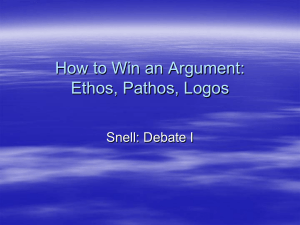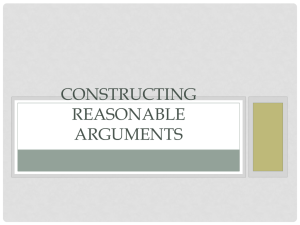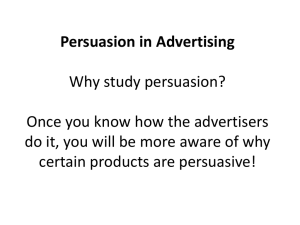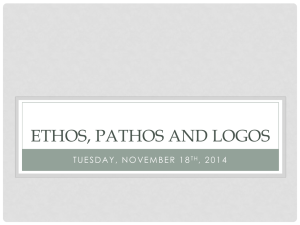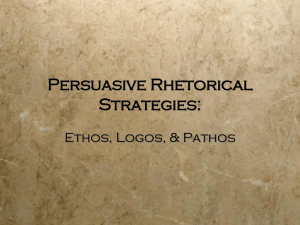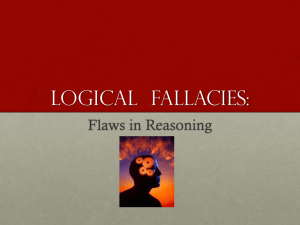Ethos_Pathos_Logos
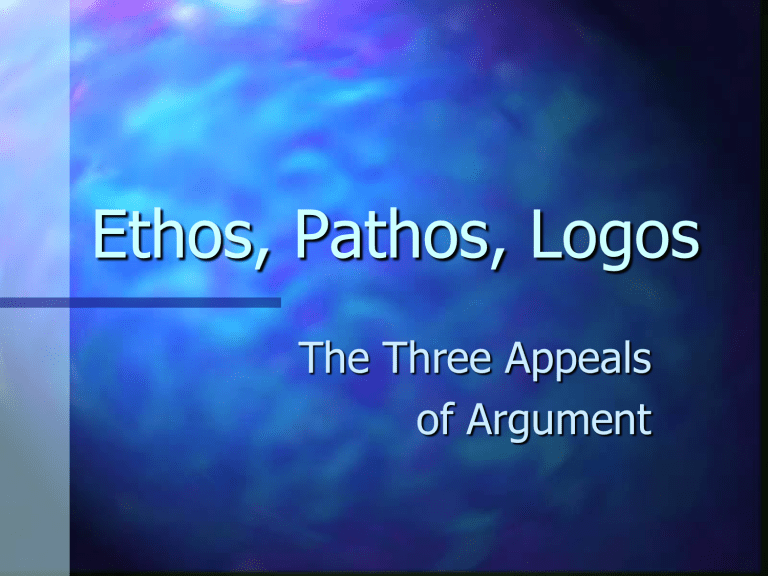
Ethos, Pathos, Logos
The Three Appeals of Argument
Rhetoric
Approximately 2300 years ago Aristotle wrote a piece,
On Rhetoric,
in which he laid out the three elements of persuasion: ethos, logos and pathos.
Rhetoric is defined as the art of persuasion, and Aristotle’s writing on it is considered a seminal work for other how-to guides through the years.
Ethos
Ethical appeal
Ethos
Definition: In rhetoric, ethos refers to the values, credibility, and/or background of the speaker
(e.g. shows that the person making the argument has a certain degree of credibility, is of good character and sound sense, and is qualified to be making the argument)
Environmental issues: Al Gore’s ethos vs. Brad Pitt
Guiding Questions: Are you someone worth listening to? Do you know what you’re talking about?
Creating Ethos
Be your best self…act in such as way as to gain your audience’s trust.
Be(come) an expert on your topic.
Give yourself props…let your audience know how your past experiences have made you a credible source.
Talk to your audience. Know who you’re talking to and speak in terms and with examples they can understand.
Quote reliable sources.
Pathos
Emotional appeal
Pathos
Definition: In rhetoric, pathos refers to emotions/feelings
It is appropriate to use emotional appeal in your argument
Trouble occurs when you make this the sole or primary basis of your argument
Guiding Question: Can the reader connect with you on an emotional level? Can you make them care about what you are saying?
Creating Pathos
Use in conjunction with logos to reach your audience
Emotions appeal to audience more powerfully than reason alone
Can be used effectively in anecdotal evidence
Use humor
Use analogies (joblessness is a disease infecting our nation)
Use words, tones, expressions, gestures, etc that convey emotion
Know your audience…universal human emotions and particular groups’ concerns
Logos
Rational appeal
Logos
Definition: In rhetoric, logos refers to logic/reasoning.
Based on logical argument & appropriate evidence
Logical arguments commonly of two types:
Deductive
Inductive
Guiding Question: Does what you are saying make sense? Does your evidence add up to your conclusion?
Creating Logos
Be crystal clear….use plain terms and break everything down
Go through sequences and processes (if a=b and b=c, then a=c)
Use data and details
Use analogies that they know and understand
Look at the opposing side’s views and counter them
Use real life examples
Cite research
Ethos: Are you a credible source? An expert? Have you done your research?
Pathos: Are you connecting to your audience on an emotional level?
Logos: Are your points rational? Have you thought this through?
Does your evidence support your thesis?
Logical
Appeal
(Logos)
Persuasive arguments that speak to readers’ common sense and logic.
Drink Coca-Cola because it will quench your thirst.
Ethical
Appeal
(Ethos)
Persuasive arguments that address the readers’ sense of right and wrong. They also rely on the reader’s belief that the writer is
Drink Coca-Cola because the corporation donates many of its profits to local charities.
Emotional
Appeal
(Pathos) ethical.
Persuasive arguments aimed at the readers’ hearts. Emotional appeals speak to emotions such as fear, love, sympathy, and pride. On the negative side, these appeals often appeal to readers’ fears based on
Drink Coca-Cola because its flavor will leave you feeling happy and refreshed.
stereotypes.
Tree Map Practice
LOGICAL
PERSUASIVE
APPEALS
ETHICAL EMOTIONAL
1.
2.
3.
4.
5.
6.
7.
8.
9.
10.
11.
12.
An argument based on evidence
An argument based on feelings
An argument based on morality
An argument based on statistics
An argument based on reasoning
An argument based on sympathies
An argument based on facts
An argument based on laws
An argument based on human needs
An argument based on religious beliefs
An argument based on justice and fairness
An argument based on shocking anecdotes .
PERSUASIVE
APPEALS
ETHICAL EMOTIONAL
LOGICAL
An argument based on evidence
An argument based on morality
An argument based on feelings
An argument based on statistics
An argument based on reasoning
An argument based on facts
An argument based on laws
An argument based on religious beliefs
An argument based on human needs
An argument based on justice and fairness
An argument based on sympathies
An argument based on shocking anecdotes .
